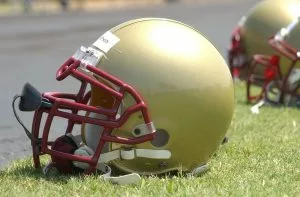
The First District Appellate Court of Illinois held in Nakamura v. BRG Sports, LLC that a former NFL player’s personal injury suit against his helmet manufacturer stemming from a severe concussion the player suffered was allowed to proceed as there was an issue of fact as to when the player discovered his injury. The trial court initially dismissed the player’s action as being time barred by Illinois’ two-year statute of limitations for personal injury actions.
In August of 2013, Haruki Nakamura was taken to the hospital after suffering a severe concussion during a preseason football game while playing for the Carolina Panthers. Nakamura’s condition worsened following the concussion as he continued to suffer from extreme headaches, impaired cognition, and depression. Nakamura was eventually released by the Panthers and he was forced to retire from football. After his retirement, Nakamura filed a disability insurance claim in November of 2013 claiming that he was suffering from several post-concussive symptoms and that he was permanently disabled. During the course of litigation involving his disability claim, Nakamura was diagnosed as having chronic post-concussion syndrome. Nakamura then commenced a separate personal injury action in October of 2017 against the helmet manufacturer, Riddell, for negligence and strict product liability alleging that the helmet he was wearing at the time of the concussion was defective and failed to protect him from the head trauma that resulted in latent neurodegenerative disorder.
Under Illinois’ discovery rule, the statutory limitations period starts to run when a person knows or reasonably should know of his injury and also knows or reasonably should know that it was wrongfully caused. The trial court dismissed the personal injury action finding that Nakamura’s claims were barred by the statute of limitations because Nakamura knew of his injury at least two years prior to commencing suit. As evidence of Nakamura’s knowledge of his injury, Riddell directed the trial court to the disability claim litigation commenced in November of 2013 wherein Nakamura alleged he suffered a concussion and was permanently disabled in 2013.
On appeal, the First District reversed the trial court. The First District held that Nakamura’s knowledge of his concussion in 2013 and even his knowledge of memory problems, headaches and depression stemming from the concussion did not establish that he knew about the cumulative and progressive injury he suffered while playing football that can result in lifelong neurodegenerative disorder, which manifests over several years as a result of repetitive head trauma.
The First District reasoned that the knowledge of having suffered one concussion does not mean that an individual has knowledge of all brain-related injuries including an injury that does not manifest itself right away. As a result, the First District found that there was a question of fact as to when Nakamura knew or should have known about his injury and its wrongful cause.
The case addresses a unique issue as to when an injured party is required to file suit when their injury does not reveal itself until several years after the initial event that resulted in the injury. The attorneys at The Collins Law Firm have handled hundreds of personal injury matters including those involving traumatic brain injuries and are here to ensure their clients get their day in court.

"*" indicates required fields